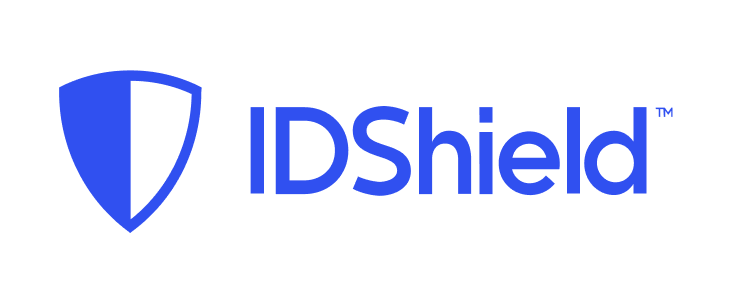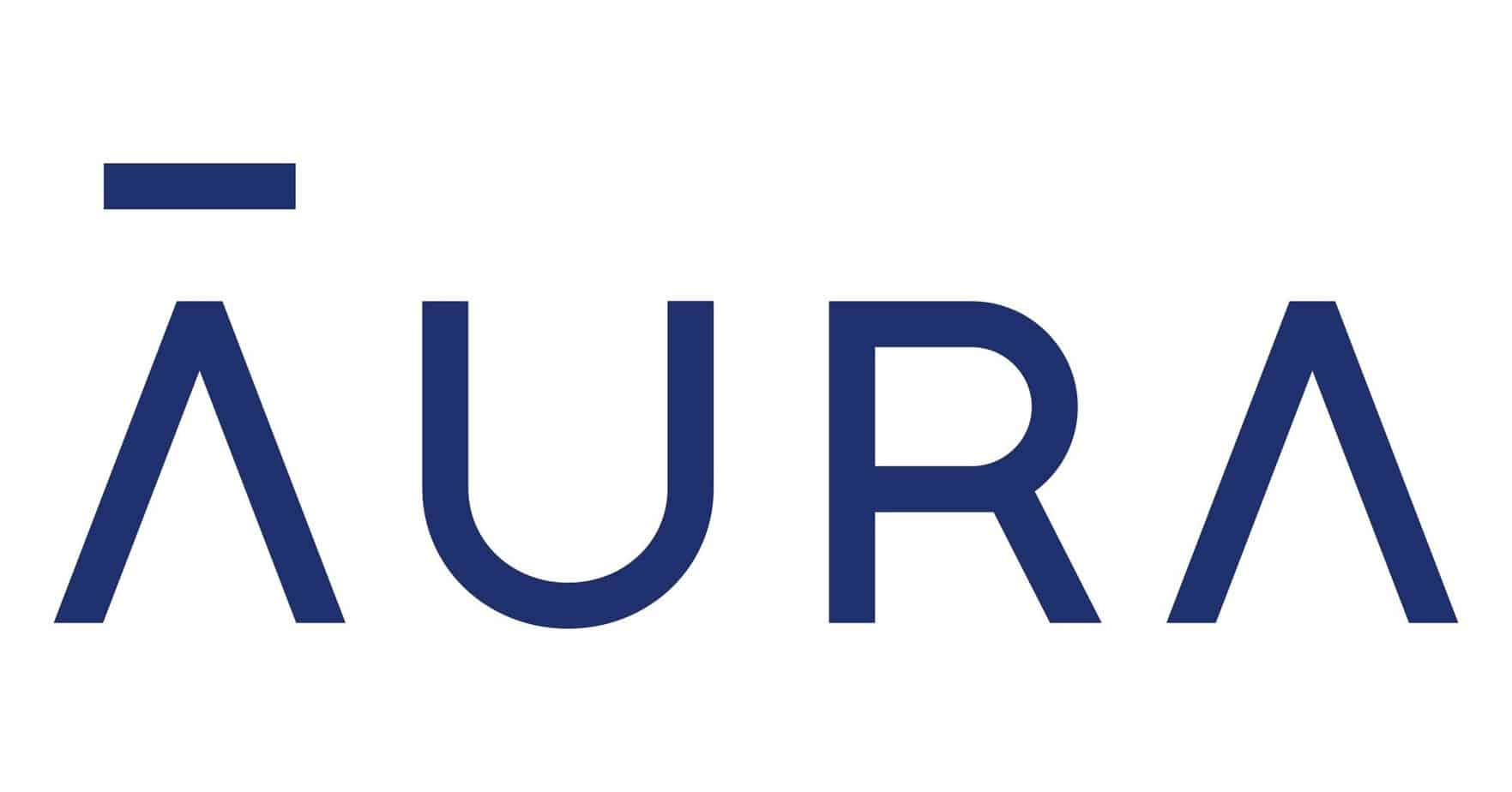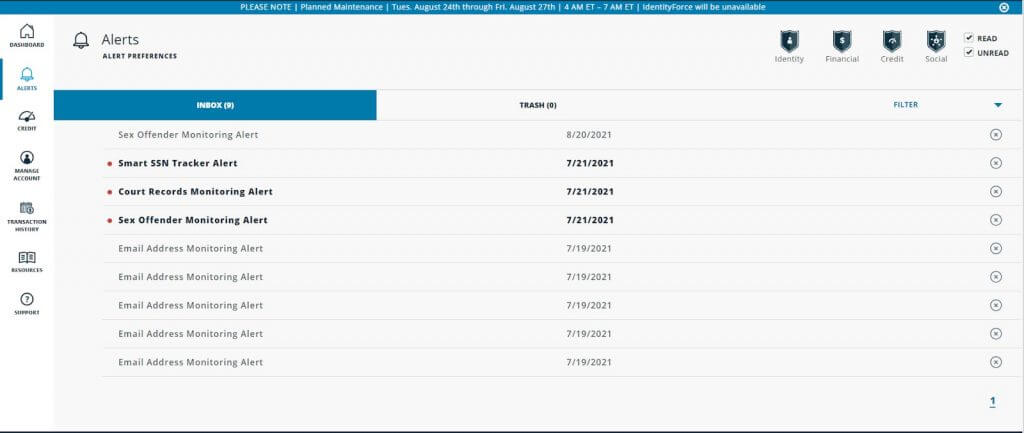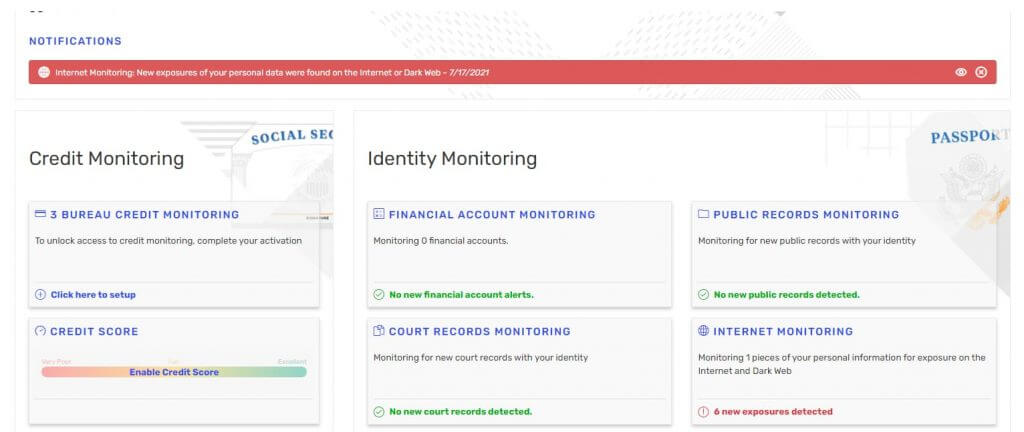IdentityForce vs IDShield Comparison: Which One Comes Out on Top?
We tested IDShield and IdentityForce head-to-head for three months. The results made it clear – IDShield is the winner.
IDShield found eight dark web alerts, while IdentityForce only found seven, proving IDShield offers more accurate monitoring services.
IDShield also comes with an identity restoration guarantee. In the event of a theft incident, they promise to get your identity back to pre-theft status or your money back.
IDShield has more valuable additional services, too, including reputation management tools and antivirus software.
Plus, our IDShield discount code, making it a better value than IdentityForce.


- You want more accurate monitoring and the peace of mind that comes with it.
- You want a restoration guarantee. If the worst happens, it’s nice knowing your identity protection service truly has your back.
- You value additional digital tools to help you manage your online presence in full.
- You want lightning-fast threat detection, even if it’s not as accurate.
- You don’t have social media and don’t need a reputation management tool.
- You’re willing to pay more for a lesser service.
Home Security Heroes independently tests and reviews every product. We may earn a commission when you buy through our links. Read more here.
IdentityForce and IDShield offer most of the above, but neither one is as powerful as Aura. And, both of them cost more.
If you’re trying to find the best identity protection service for you and yours, I can help.
In this article, I’ll discuss IDShield and IdentityForce in detail. I’ll cover their monitoring services, threat resolution capabilities, and additional features. I’ll also offer my thoughts on their user interfaces, insurance coverage, family plan offerings, and price points.
Ultimately, you’ll understand why IDShield comes out ahead of IdentityForce. You’ll also see why Aura remains my top overall pick.
IdentityForce vs IDShield: Head to Head Comparison
IdentityForce and IDShield offer very similar services. When you put them next to each other, it’s hard to see many differences between them.
Both offer decent monitoring, white-glove restoration services, and $1 million in insurance coverage.
Both could also offer a more streamlined sign-up process. And, compared to Aura, they’re both overcharging for their services.
IDShield comes out a smidge ahead because of little details. Its monitoring is a little more comprehensive, its additional features a bit more useful, and its prices a few cents better.
I’ll explain all that in deep detail below, but if you’d rather not waste time, check out Aura instead. It offers more than either IdentityForce or IDShield at a better price.
Editor’s Ranking Table
 |  |  | |
Overall Score | |||
Monitoring & Alerts |
|
|
|
Threat Resolution |
|
|
|
Theft Insurance Per Adult |
|
|
|
Customer Support |
|
|
|
Additional Services |
|
|
|
Cost |
|
|
|
Renewal Price Increased After 1st Year? |
|
|
|
Promo Code |
Monitoring and Alerts: Winner – IDShield
Both IdentityForce and IDShield do a respectable job of monitoring the web and alerting you to online threats. Neither is as good as Aura (or even Identity Guard) in this category, but they’re also not bad by any means.
Both offer all the monitoring services I expect to see, such as:
Where they differ is in quality.
I’ll dig into specifics below, but overall, IDShield offers better threat protection and a more useful alert dashboard.
Dark Web Monitoring
After signing up for IdentityForce, my dashboard blew up with alerts. In less than one minute, I received 19 dark web alerts, seven of which were unique. I expected to see all of them (Aura caught far more in testing—35, of which 15 were unique), but the speed was impressive.
IDShield’s speed isn’t something I can comment on. Unfortunately, their sign-up process is a little clunky (more on that later), and they take 24 hours to process payments. By the time I was able to log in and start my testing, their scan was complete.
IDShield turned up a respectable 24 alerts, eight of which were unique. Again, not Aura, but better than IdentityForce.
Alert Dashboard
Here’s where IDShield stands out.
Its alert dashboard is clean and informative. There’s a bold heading that gives you the alert category. It may say “Social Media Alert” as an example. Then, it will list further details like “login credentials.”
Plenty of white space in between makes it easy to scan the information. As a result, you can get a good idea of the threat without making any clicks away from the dashboard.
IdentityForce’s dashboard isn’t bad; it’s just not as easy to use.
Alerts come in with very little information. There’s a heading category and a date. Seeing the same alert heading over and over without any details starts to desensitize you to the threat.
Credit and Financial Monitoring
IDShield’s credit and financial monitoring is good, but IdentityForce comes out on top here.
Let me explain…
With its top-tier plan, IdentityForce offers 3-bureau credit monitoring with a full credit suite. This suite includes a credit tracker that shows your credit score in a month-over-month graph. It also offers a credit simulator that lets you see what would happen if you took on more debt, paid off a credit card, or applied many other financial decisions.
IdentityForce also offers investment account monitoring—meaning it will track your 401(K) and other retirement accounts.
However, IdentityForce doesn’t offer any credit monitoring with its lower-level plan. And, it’s missing handy features, like credit freeze or lock assistance.
IDShield offers 1-bureau credit monitoring with its low-end plan and 3-bureau monitoring with its higher-priced option. It doesn’t have quite the range of credit monitoring features that IdentityForce has, but it does offer credit freeze assistance and a monthly tracker.
Freeze assistance is a great tool for preventing identity theft, but IdentityForce’s broader range of credit tools and their investment account monitoring put them ahead.
Public Records Monitoring
In this area, IdentityForce and IDShield are tied.
Both monitor court and criminal records to ensure no one is committing crimes in your name. That’s great, but it’s also pretty standard.
Neither offers detailed records monitoring, which would include home and auto title monitoring. For that, you’ll need to go with Aura.
Threat Resolution: Winner – IdentityForce
 |  |  | |
Expertise |
|
|
|
US Based Support? |
|
|
|
Customer Hours |
|
|
|
Concierge Resolution |
|
|
|
Lost Wallet Protection |
|
|
|
This was a close call.
Truth be told, both IdentityForce and IDShield offer top-notch threat resolution services. They have excellent customer care teams, experienced restoration specialists, and decent wallet protection.
There’s only one glaring difference – Availability.
I’ll explain more below, but in a nutshell, IdentityForce’s team offers 24/7 availability for any member service-related question.
IdentityForce also has a unique feature in this category that sets it apart from any other identity protection service — white glove restoration for the family. For more details on that, read on.
Customer Support
Let’s start with what’s good with both of these services.
When I called IdentityForce one Friday afternoon, I reached a human within two minutes, which is pretty good.
Technically, IDShield was better. They answered in under one minute.
However…
Had I called after 6 p.m. CST, I wouldn’t have reached a human at all. That’s when IDShield’s customer support team shuts down for the evening.
Now, IDShield does have an emergency line that’s available 24/7/365, but IdentityForce’s 24/7 availability for all questions is a much better service.
I will say that both customer care teams seem extremely knowledgeable and are U.S-based. They had no issue answering my questions. So, from that perspective, IdentityForce and IDShield are evenly matched.
Concierge Services
Both IdentityForce and IDShield offer white glove restoration services.
Should a thief manage to steal your identity, both companies will handle the heavy lifting for you. They’ll file paperwork, make phone calls, and walk you through the restoration process step by step.
IDShield does this using licensed private investigators, and IdentityForce employs restoration specialists. I’m not sure that a licensed PI will do much better than a restoration specialist, but IDShield certainly touts them as if they will.
Here’s the real difference:
IdentityForce offers white glove family restoration.
I don’t mean restoration included with their family plan.
I mean IdentityForce offers their identity restoration services to every plan member’s immediate family, with or without a family plan. This is a feature unique to IdentityForce. I haven’t seen another identity protection service try to mimic it.
Wallet Protection
When it comes to wallet protection, there are no discernable differences between IDShield and IdentityForce. Both will help you cancel your credit and debit cards. Their teams will also assist with replacing your driver’s license and other forms of ID.
There is one thing I should point out, though…
IdentityForce only provides credit monitoring with its top plan. If your wallet is lost or stolen, it’s a good idea to keep an eye on your credit report for any signs of fraudulent activity. That’s going to be difficult if you have IdentityForce’s lower-tier plan.
Theft Insurance: Winner – IdentityForce
 |  |  | |
Theft Insurance Score | |||
Theft Insurance |
|
|
|
IdentityForce and IDShield both offer $1 million in theft insurance coverage. This coverage doesn’t change if you add family members to your plan. So, whether you have an individual plan or choose to include your spouse and children, the coverage remains at $1 million.
This isn’t nearly as good as Aura’s insurance coverage which provides $1 million per adult, up to $5 million total in family coverage.
Still, $1 million is decent and meets the industry standard.
The reason IdentityForce wins here is simple:
IdentityForce is transparent about its coverage, how it breaks down, and what it includes. IDShield is not.
When you sign up for IdentityForce (and even before you sign up), you can easily review and reference the insurance coverage that comes with their plans. It looks like this, in case you’re curious:
- $1 million aggregate insurance coverage.
- $2,000 per week in lost wages for up to 5 weeks.
- $2,000 per policy period for travel expenses.
- $2,000 per policy period for child, elder, or spousal care.
- $2,000 per policy period for an initial legal consultation.
IDShield doesn’t list its coverage breakdown anywhere. They simply state that you have $1 million in coverage—what it actually covers is anyone’s guess.
Family Plans: Winner — IDShield
IDShield’s lack of transparency around their insurance coverage bothers me, but IdentityForce’s lack of clarity around their family plans drives me up a wall.
Needless to say, IDShield wins this category.
IDShield offers a family version of both of their plan tiers. The family version covers two adults and unlimited dependents under the age of 18. This isn’t nearly as generous as some identity protection service policies (Aura covers up to five adults), but it’s not bad.
IdentityForce offers family plans, but to learn about their pricing and inclusions, you have to call their sales team.
After a lengthy phone call one Monday afternoon, I learned their family plan is $35.90 per month (though that price is subject to change). It includes two adults and an unlimited number of children, much like IDShield. And, it offers the same coverage as their UltraSecure + Credit plan (their top-tier option).
Alternatively, you can add their ChildWatch features to any individual adult plan for $2.75 per month.
ChildWatch is pretty cool if you’re a parent. It provides full identity monitoring for kids, including social media monitoring. It can alert you to cyberbullying, discrimination, and other sensed threats.
And, it’s great that you can add ChildWatch without purchasing a full family plan. Single parents, especially, can take advantage of that option.
Still, as much as I like ChildWatch, it doesn’t make up for IdentityForce’s lack of transparency surrounding their family plans. I don’t like wasting time with a sales rep, and my guess is you won’t either.
Ease of Use: Winner – IDShield
IDShield comes out ahead here.
But honestly, both of these services could do better when it comes to ease of use.
Here’s what I mean…
IDShield has a sleeker interface. It’s clean and simple to navigate. You can check on alerts, look over your credit report, or check your credit score in a click or two.
IdentityForce is a little clunky. It doesn’t look as streamlined, everything is pushed together, and it can take several clicks to get where you want to go.
However, both of these services struggle in the initial signup process.
IdentityForce took me ten minutes to sign up for.
Maybe that doesn’t sound like very long, but other services, like IDShield, are a lot faster.
IDShield’s sign-up process took about five minutes.
But then, IDShield said it needed 24 hours to process my payment. And, once the payment went through, things got more complicated.
The first email IDShield sent took me to a dashboard I thought was theirs. It turns out it was LegalShield’s dashboard (IDShield’s parent company).
Once I was inside LegalShield’s dashboard, it asked me for a customer number which came via a welcome email. Only after I inputted my customer number did I gain access to the actual IDShield dash. So, not the most streamlined process!
Additional Services: Winner – IDShield
 |  |  | |
Additional Services |
|
|
|
IDShield wins for added services, hands down.
It offers:
- A VPN
- Password Manager
- Antivirus software (for up to 15 devices)
- Reputation management services—meaning IDShield scans your social media and helps you clean up old photos, posts, and other content you may not want to be associated with.
IdentityForce only offers a password manager and VPN.
Cost: Winner – IDShield
 |  |  | |
Promo Code | |||
Individual Plan Cost |
|
|
|
Couple Plan Cost |
Covers 2 Adults |
|
|
Family Plan Cost |
Covers 5 adults & unlimited kids |
|
|
Renewal Price Increased After 1st Year? |
|
|
|
Promo Code |
IDShield and IdentityForce are both relatively pricey, but IDShield costs just a bit less and offers more features.
Here’s how it breaks down.
At its top tier, IdentityForce charges $23.99 per month for individuals and $35.90 per month for families.
IDShield charges $19.95 per month for individuals, and $34.95 for families.
I have to point out that Aura beats both of these pricing structures by a long shot, especially when you use our promo code.
Verdict: Overall Winner — IDShield
IDShield comes out ahead in the IdentityForce vs. IDShield match.
IDShield offers slightly better monitoring services, better family plans, and better additional features. Plus, it costs just a little less than IdentityForce.
But comparing these two is like comparing two second-place teams.
Even with IDShield, you’re settling for a second-rate service. When it comes to protecting your identity (and your family’s), that’s not a good idea.
If you want the best identity protection service for you and your family—one that offers $5 million in family theft insurance, all the extras like a VPN and parental controls, and the most comprehensive monitoring available, you want Aura.
So, forget IDShield and IdentityForce and check out how much Aura costs instead. You and your loved ones will be glad you did.
Other Comparison Articles:
Citations:
1. https://www.sciencedirect.com/topics/computer-science/cybercrime
3. https://javelinstrategy.com/2022-Identity-fraud-scams-report




